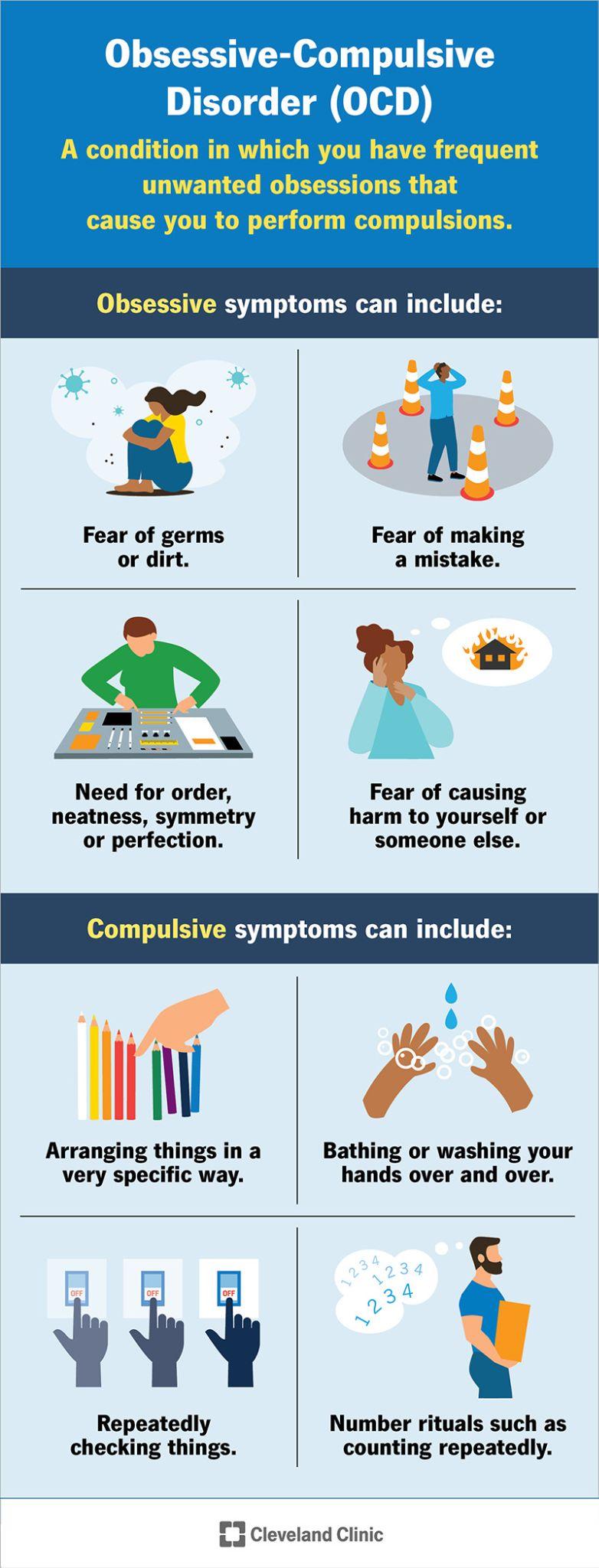Obsessive Compulsive Disorder (OCD): Symptoms, Treatment and
Supportive Strategies
What is it:
Obsessive-Compulsive Disorder (OCD) is a mental health condition in which individuals have unwanted
thoughts and fears known as obsessions, which lead to repetitive behaviours called compulsions.
Individuals with OCD may experience both obsessions and compulsions simultaneously. Although OCD is
typically a chronic condition, its symptoms can fluctuate and may come and go over time.
Examples of OCD behaviour:
Obsessions:
- Recurrent, unwanted thoughts or mental images that cause distress such as persistent fears of
contamination, germs, dirt or toxic substances.
- Constant worry about harm to oneself or loved ones.
- Intense discomfort when objects are not arranged in a specific order or symmetry.
- Unwanted, distressing thoughts of losing control and causing harm to oneself or others.
- Intrusive, taboo or disturbing sexual thoughts or images.
- Fear of offending or showing disrespect to God.
- Persistent doubt about completing a task correctly such as locking the door or turning off the
stove.
- Preoccupation with the body and health concerns often fearing severe illness despite reassurance
from doctors.
Compulsions:
- Repeatedly washing hands or cleaning objects.
- Frequently checking locks, appliances or switches.
- Inability to discard items leads to cluttered living spaces.
- Arranging and rearranging items in a specific order.
- Repeating phrases, prayers or counting silently to reduce anxiety.

Who is likely to get OCD:
OCD can develop at any age, but it usually begins in the teen or young adult years. Factors that can
possibly cause OCD and help diagnose:
- Family history and genetic predisposition.
- Abnormalities in brain structure and neurotransmitter imbalances.
- Traumatic or stressful events such as abuse, bullying, severe neglect, death of a loved one or
significant life changes.
- Individuals with certain mental health disorders such as anxiety disorders, depression and
substance abuse.
How to diagnose OCD:
While there is no specific diagnosis test, a Mental Health Professional (MHP) diagnoses the condition
after knowing the individual's family history and a detailed enquiry of the symptoms, including the
nature of their obsessions and compulsions, their severity, duration and impact on daily functioning.
Treatment options for OCD:
Treating OCD generally involves a combination of therapy and medication prescribed by Mental Health
Professionals including psychiatrists, psychologists, psychiatric social workers and therapists
- Medication: Only a psychiatrist is allowed to prescribe medicines. Medicines work
by affecting the chemical imbalance in your brain, reducing the severity of symptoms. Always take
prescribed medicines and never discontinue them without your treating psychiatrist.
- Psychotherapy: Talk therapy methods like Cognitive Behavioural Therapy (CBT) can
help cope with and manage the condition. A variety of brain stimulation therapies can be used in
cases where standard treatments prove ineffective.
Supporting someone with OCD:
Supporting someone with OCD as a caregiver involves employing supportive strategies to manage
symptoms, reduce stress and promote their overall well-being. Some practical steps you can follow are:
- Encourage them to attend therapy regularly, keep track of their symptoms and identify triggers. If
you have any concerns, consult their psychiatrist or therapist.
- Help them remember to take their medications as prescribed. Keep an eye out for any side effects
and talk to their healthcare provider if needed.
- Be there emotionally for them by talking openly about their feelings and experiences with OCD.
Encourage them to connect with others to reduce the isolation and support.
- Support them in staying physically active, getting enough sleep, eating well and avoiding alcohol
or drugs for their overall health.
- Learn more about OCD so you can understand it better and provide better support. Stay updated on
treatment options and resources available for managing.
Seek support or assistance from your friends, family, caregiver or whoever is near you when your
symptoms worsen or you struggle to manage them. If you or someone you know is struggling with OCD
consider reaching out to a mental health professional for guidance and support. In India, you can
contact the mental health helpline Tele MANAS at 14416 OR 1-800 891 4416 available every day of
the
week and offering support in multiple languages.

